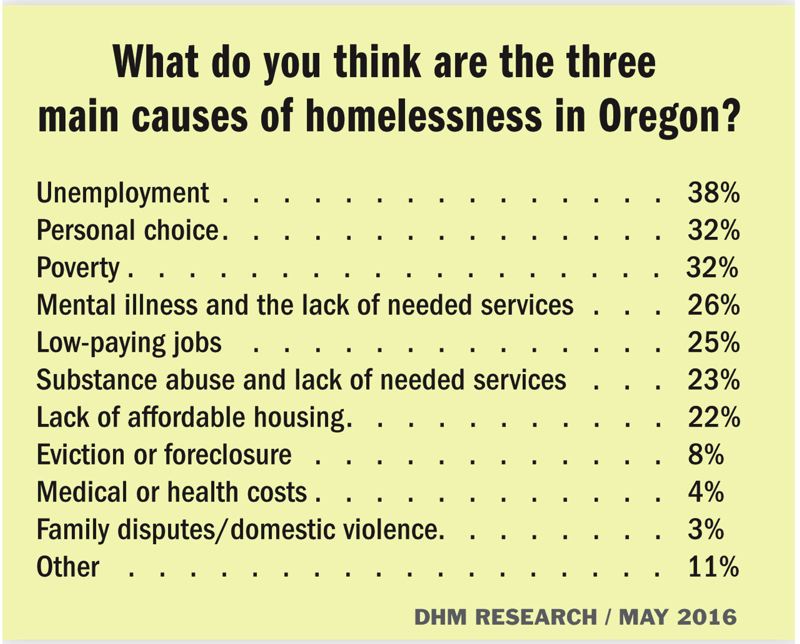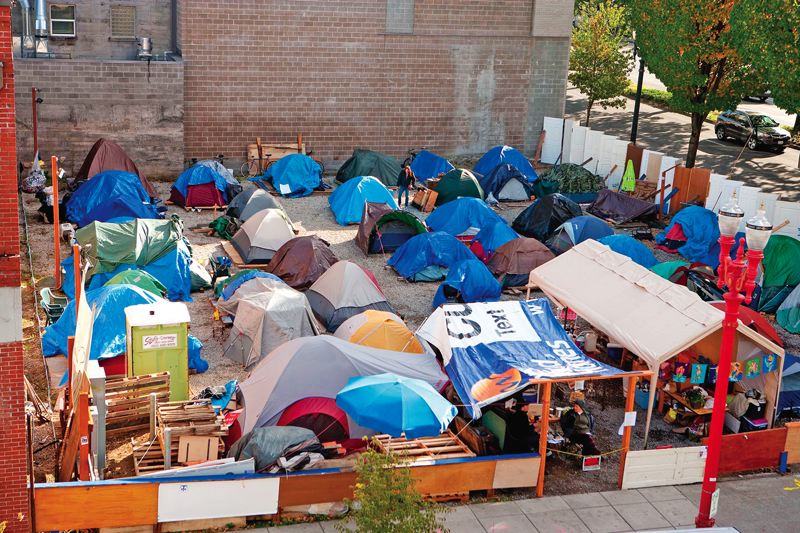Portland Tribune, June 28, 2016
Eds. Note – this is a completely useless article filled with assumptions and misguided notions of help, drifting quickly in the moral maze of civil liberties. The author does not understand the subject. Yet we feel compeled to include it as a snapshot of what goes on for thinking about the subject of “homelessness.”
 Is a lack of affordable housing the root cause of homelessness?
Is a lack of affordable housing the root cause of homelessness?
Some local affordable housing advocates are making that argument as they press Portland and Multnomah County leaders to spend millions of dollars to create more affordable housing.
But most people in Oregon and the Portland area don’t agree with that premise, according to a recent survey by DHM Research.
READ – DHM Panel Survey, May 2016 (PDF, 117KB)
Although the vast majority of respondents believe the state and region is facing a housing crisis, most believe homelessness is best viewed as a separate issue that requires other solutions.
When asked why people end up on the streets, Oregonians are much more likely to cite a lack of jobs and social services than a scarcity of affordable housing.
 Similarly, most respondents don’t believe that building more affordable housing is the best government response to homelessness. Far more believe limited resources should first be spent to increase the number of emergency shelters and transitional facilities.
Similarly, most respondents don’t believe that building more affordable housing is the best government response to homelessness. Far more believe limited resources should first be spent to increase the number of emergency shelters and transitional facilities.
Such views could present a challenge for those pushing the Portland City Council to refer a $258.4 million affordable housing bond measure to the Nov. 8 general election ballot. It would increase property taxes 42 cents for each $1,000 of assessed value.
“There’s a disconnect between what the public thinks about homelessness and what the leaders are proposing,” says DHM Research Vice President and Political Director John Horvick. “That doesn’t mean such a ballot measure won’t pass, but there needs to be more of a conversation about the problems and the solutions.”
In fact, most respondents to the DHM survey do not believe homelessness is a problem that can be solved. Sixty-seven percent of statewide respondents and 60 percent of metro respondents agree that even if we make changes to society, some people will always be homeless. Only 30 percent of statewide respondents and 34 percent of metro respondents thought it could be ended completely.
Market driving up housing costs
According to DHM’s online survey of 687 Oregonians taken in May, 83 percent agree the state is in a housing crisis caused by rapidly increasing rents and home prices. The number is slightly higher in the metro region at 86 percent.
Most respondents agree the affordable housing crisis is driven primarily by market forces. Statewide, 37 percent say the market is reacting to an increase in population and desirability, and no one person or thing is to blame. A smaller group, 26 percent, accuses people with higher incomes moving into Oregon and driving up prices. An even smaller group, 11 percent, say developers aren’t building housing that most Oregonians can afford.
The numbers are similar in the metro area, although 12 percent blame the urban growth boundary for limiting the land supply and driving up housing costs, while only 8 percent do so statewide.
 Whatever the cause, 76 percent of statewide respondents agree it has affected the number of people experiencing homelessness. Even more — 84 percent — in the metro area agree.
Whatever the cause, 76 percent of statewide respondents agree it has affected the number of people experiencing homelessness. Even more — 84 percent — in the metro area agree.
But, given a choice, 68 percent of respondents are more likely to agree that homelessness is best viewed as a separate issue from affordable housing. Only 28 percent were more likely to agree that the number of those experiencing homelessness is directly related to the cost of housing.
The split was not that different in the metro area, with 65 percent viewing homelessness as a separate issue, and 31 percent saying it is directly related to the lack of affordable housing.
Asked to pick the main causes of homelessness in Oregon, the largest block — 38 percent — chose unemployment. It was followed by personal choice, poverty, the lack of mental illness services, low-paying jobs, and the lack of substance abuse services. The lack of affordable housing came in seventh with only 22 percent.
The rankings were somewhat different in the metro area, however. But even here, the lack of affordable housing was not the top choice.
Here, unemployment tied with the lack of mental illness services for first place at 35 percent each. In second place was poverty at 34 percent. Then the lack of affordable housing tied with the personal choice at 25 percent each. They were closely followed by low-paying jobs and the lack of substance abuse treatment at 23 percent each.
“The public does not believe there is one main cause of homelessness. They think there is a range of causes, and some of them involve personal behaviors,” Horvick says.
When it comes to government responses to homelessness, most respondents did not think creating more affordable housing was the most effective policy. Statewide, 42 percent of respondents chose increasing emergency shelters and transitional facilities for the homeless. Providing assistance for those currently at risk of losing their homes was second with 18 percent, followed by creating more affordable housing at 17 percent.
Creating more affordable housing was ranked higher in the metro area at 23 percent. But it still trailed the 34 percent who chose increasing emergency shelters and transitional facilities first. Providing rental assistance to those currently living on the streets and in shelters came in third at 21 percent.
Bond measure has chance
Despite the questions concerning homelessness, the poll suggests an affordable housing bond measure could pass in Portland. Fifty-nine percent of respondents in the metro area think such a measure could improve housing affordability. Of those, 21 percent think it could improve affordability “a lot.”
But that does not mean a bond measure is their No. 1 choice. To the contrary, requiring developers to include affordable units in their projects was favored by 75 percent. The City Council is in the process of adopting such a requirement, following the repeal of the statewide ban on so-called inclusionary zoning by the 2016 Oregon Legislature.
Rent control policies were favored by 70 percent of metro respondents, with more than half, 38 percent, saying they would improve affordability “a lot.”
The only two options offered in the poll that fared worse than a bond measure were a ban on no-cause evictions at 58 percent, followed by increased restrictions and stronger enforcement on short-term rentals like AirBnB at 32 percent.
Even if Portland voters are willing to pass a bond measure, only 13 percent of metro respondents think the city should be most responsible for addressing affordable housing needs. More, 17 percent, say county and regional governments should. Even more, 27 percent, say the state government should.
And 20 percent say no government should be responsible for addressing affordable housing needs. They say the housing market can and will correct itself in the future.
But if the measure does pass, the largest block of metro respondents believes the money will go to the right place. It will be spent by an agency dedicated to housing, the Portland Housing Bureau, which was favored by 44 percent. The next largest block, 23 percent, thought affordable housing should be driven by the market, not developed by government agencies. After that, 16 percent thought it should be managed locally by whatever local agency is best equipped.

